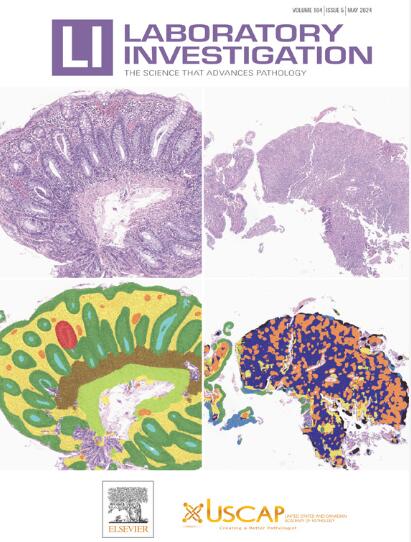Nuclear Receptor–Binding SU(VAR)3-9, Enhancer of Zeste, Trithorax Domain Structural Domain Protein 2 Serves as a Potential Prognostic Biomarker in Mantle Cell Lymphoma
IF 4.2
2区 医学
Q1 MEDICINE, RESEARCH & EXPERIMENTAL
引用次数: 0
Abstract
Nuclear receptor–binding SET structural domain protein 2 (NSD2) has been implicated in the pathogenesis of multiple cancers, exhibiting mutations or overexpression that contributes to tumor progression and poor clinical outcomes. In mantle cell lymphoma (MCL), approximately 15% of patients harbor NSD2 mutations; however, its clinical significance remains to be fully elucidated. In our study, we analyzed Next Generation Sequencing data from 147 MCL patients and identified NSD2 mutations in 8.84% (13/147) of cases, with 92.31% (12/13) demonstrating bone marrow involvement. Immunohistochemical evaluation of NSD2 protein expression in 39 patients revealed that high levels of NSD2 protein expression were associated with higher Mantle Cell Lymphoma International Prognostic Index scores, poorer treatment response, inferior overall survival, and progression-free survival. Furthermore, NSD2 expression is strongly associated with aggressive histologic variants, including elevated c-MYC protein expression and a high Ki-67 proliferation index. Our analysis of the cBioPortal database, encompassing lymphoma patients, uncovered that NSD2 mutations are most prevalent in MCL. Specifically, E1099K and T1150A point mutations were linked to poorer prognoses. Additionally, our examination of the Gene Expression Omnibus database (GSE93291) revealed a correlation between NSD2 messenger RNA (mRNA) expression levels and MKI67, with elevated NSD2 mRNA expression being associated with reduced survival rates. Tumor-infiltrating immune cell analysis with CIBERSORT in GSE93291 revealed the correlation with increased intratumoral regulatory T cells. According to our research, NSD2 mutations exhibit extremely aggressive biological behavior, and a worse prognosis is associated with higher levels of NSD2 in both mRNA and protein expression. We believe that NSD2 stands as a valuable prognostic marker and a potential therapeutic target in MCL.
NSD2可作为套细胞淋巴瘤的潜在预后生物标志物。
NSD2与多种癌症的发病机制有关,表现出突变或过表达,导致肿瘤进展和不良临床结果。在套细胞淋巴瘤(MCL)中,大约15%的患者携带NSD2突变;然而,其临床意义仍有待充分阐明。在我们的研究中,我们分析了147例MCL患者的下一代测序(NGS)数据,在8.84%(13/147)的病例中发现了NSD2突变,其中92.31%(12/13)的病例显示骨髓受损伤。免疫组织化学(IHC)对39例患者NSD2蛋白表达的评估显示,高水平的NSD2蛋白表达与较高的套细胞淋巴瘤国际预后指数(MIPI)评分、较差的治疗反应、较差的总生存期(OS)和无进展生存期(PFS)相关。此外,NSD2表达与侵袭性组织学变异密切相关,包括升高的c-MYC蛋白表达和高Ki-67增殖指数。我们对包含淋巴瘤患者的cbiopportal数据库的分析发现,NSD2突变在MCL中最为普遍。具体来说,E1099K和T1150A点突变与较差的预后有关。此外,我们对Gene Expression Omnibus (GEO)数据库(GSE93291)的检查显示NSD2 mRNA表达水平与MKI67之间存在相关性,NSD2 mRNA表达升高与存活率降低相关。使用CIBERSORT对GSE93291的肿瘤浸润免疫细胞进行分析,发现与肿瘤内调节性T细胞(Tregs)增加相关。根据我们的研究,NSD2突变表现出极具侵略性的生物学行为,较差的预后与较高水平的NSD2 mRNA和蛋白表达有关。我们相信NSD2是MCL的一个有价值的预后标志物和潜在的治疗靶点。
本文章由计算机程序翻译,如有差异,请以英文原文为准。
求助全文
约1分钟内获得全文
求助全文
来源期刊

Laboratory Investigation
医学-病理学
CiteScore
8.30
自引率
0.00%
发文量
125
审稿时长
2 months
期刊介绍:
Laboratory Investigation is an international journal owned by the United States and Canadian Academy of Pathology. Laboratory Investigation offers prompt publication of high-quality original research in all biomedical disciplines relating to the understanding of human disease and the application of new methods to the diagnosis of disease. Both human and experimental studies are welcome.
 求助内容:
求助内容: 应助结果提醒方式:
应助结果提醒方式:


